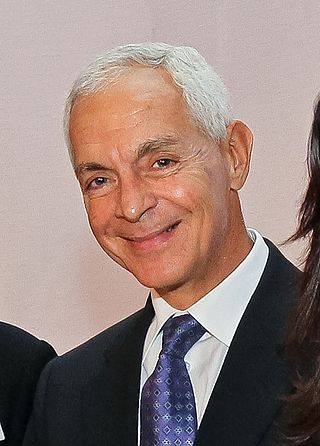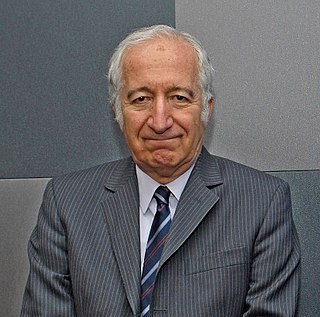
The Union of South American Nations (USAN), sometimes also referred to as the South American Union, abbreviated in Spanish as UNASUR and in Portuguese as UNASUL, is an intergovernmental regional organization. It once comprised twelve South American countries; as of 2019, most have withdrawn. It was set up by Hugo Chavez to counteract the influence of the United States in the region.

Konex Foundation is an Argentine cultural non-profit organization created in 1980 "to promote, stimulate, help, and participate in any form of cultural, educational, intellectual, artistic, social, philanthropic, scientific or sports initiative, work, and enterprise, in their most relevant aspects", as defined by its founder and president, Dr. Luis Ovsejevich.
The Central American Technological University (Spanish: Universidad Tecnológica Centroamericana) (UNITEC) is a private coeducational institution with campuses in the three main cities of Honduras: Tegucigalpa, San Pedro Sula and La Ceiba.

The Pontifical Catholic University of Argentina, also known as Catholic University of Argentina, is a private university in Argentina with campuses in the cities of Buenos Aires, Santa Fe, Rosario, Paraná, Mendoza and Pergamino. The main campus is located in Puerto Madero, a modern neighborhood of Buenos Aires.

Eduardo Francisco Costantini is an Argentine real estate developer and businessman and the founder and chairman of the Museum of Latin American Art of Buenos Aires (MALBA). As of September 2024, Forbes estimated his net worth at US$1.6 billion.

Hernando Arias de Saavedra, commonly known as Hernandarias, was a soldier and politician of criollo ancestry. He was the first person born in the Americas to become a governor of a European colony in the New World, serving two terms as governor of Governorate of the Río de la Plata, 1597–1599 and 1602–1609, and one of the Governorate of Paraguay 1615–1617.

The Federal League, also known as the League of the Free Peoples, was an alliance of provinces in what is now Uruguay, Argentina and Brazil that aimed to establish a confederal organization for the state that was emerging from the May Revolution in the war of independence against the Spanish Empire.

The Argentine Republic and the Italian Republic have had bilateral relations for over a century. Both nations enjoy friendly relations, the importance of which centers on the history of Italian migration to Argentina. Argentines of full or partial Italian ancestry number approximately 30 million, or 62% of the country's total population. Both nations are members of the G20 and the United Nations.

Grupo Werthein is an holding company founded in 1928 and based in Argentina, led by members of the Werthein family since its origins.
Jaime Davidovich was an Argentine-American conceptual artist and television-art pioneer. His innovative artworks and art-making activities produced several distinct professional reputations including painter, installation artist, video artist, Public-access television cable TV producer, activist, and non-profit organizer. He is the creator of legendary downtown Manhattan cable television program The Live! Show (1979–1984). Billed as "the variety show of the avant-garde", The Live! Show was an eclectic half-hour of live, interactive artistic entertainment inspired by the Dada performance club Cabaret Voltaire and the anarchic humor of American television comedian Ernie Kovacs.

Water resources management (WRM) functions in Argentina are handled by multiple institutions operating at the national, provincial, and river basin level, with a variety of functions and jurisdictions. On the national level, the National Institute for Water and the Environment (INA) and the National Water and Sanitation Utility (AySA) are charged with the duties of researching, water resources preservation, developing services, and implementing water projects.
Integrated urban water management (IUWM) in Buenos Aires is not unlike many large urban areas in Latin America where in past decades, more focus was placed on just a few sectors or perhaps only one sector. The water management philosophy in Buenos Aires has evolved to one that is integrating efforts in reducing water pollution, improving stormwater management, adding drainage infrastructure, and improving water supply and sanitation (WSS). Primary challenges in urban water management continue to be flood control and stormwater management as Buenos Aires is situated in the low-lying pampas region where heavy rain is expected all year long. Adding to the challenges, urbanization has outpaced planning and development in the various water sectors. Efforts have been made to control the major tributaries of Río de la Plata such as channelizing and building culverts into urban rivers, however, this has increased flooding as the natural meander and saturating ability of the rivers have been lost. Rapid urbanization and very large quantities of industrial discharge have also caused severe contamination of the water basins that Buenos Aires is built upon. The Matanza-Riachuelo river (MR), a tributary of the Río de la Plata, is a prime example and has become the most contaminated basin in Argentina.
The University of San Andrés is a private university located in Victoria, Buenos Aires, Argentina on the shores of the Rio de la Plata, in the metropolitan area of Greater Buenos Aires. It is a small institution, with approximately 900 undergraduate students and 500 graduate students.

The Argentine University of Enterprise is a private university in Buenos Aires, Argentina. It was founded by the Argentine Chamber of Corporations. Since 2003, the university's primary faculties have included the Faculty of Economic Sciences, the Faculty of Engineering and Exact Sciences, and the Faculty of Law, Social Sciences, and Communication. It is one of the top private universities in Buenos Aires.

The Southern Common Market, commonly known by Spanish abbreviation Mercosur, and Portuguese Mercosul, is a South American trade bloc established by the Treaty of Asunción in 1991 and Protocol of Ouro Preto in 1994. Its full members are Argentina, Bolivia, Brazil, Paraguay and Uruguay. Venezuela is a full member but has been suspended since 1 December 2016. Chile, Colombia, Ecuador, Guyana, Panama, Peru, and Suriname are associate countries. Bolivia became a full member on 8 July 2024.

Bernardo Kliksberg is an Argentine Doctor of Economics, recognized around the world as the founder of a new discipline, social management, and a pioneer of development ethics, social capital and corporate social responsibility. His books, papers, advisory work, and research, applies an interdisciplinary approach integrating contributions of different social sciences.

José Luis Marcelo Ventecol Mendieta is an Argentine journalist. He was born on a farm in Orán, Salta, but was registered in the Civil Registry in Jujuy.
Fundación Avina is a Latin American philanthropic foundation working towards sustainable development in Latin America by encouraging alliances between social and business leaders.

Oscar R. Gómez (Osy) is an Argentine writer, psychoanalyst and academic researcher who became renown as an integrator of Tibetan Tantric Buddhism with Western formal sciences and who constituted the first religious organization in Argentina engaged in the Tantric Worship practice in children and adults.
Ricardo Luis Armentano Feijoo is an Uruguayan professor and researcher who has worked in biomedical engineering and cardiovascular systems. He currently serves as the director of the GIBIO research group at the National Technological University — Buenos Aires Regional Faculty (Argentina). Also he is the director of the Department of Biological Engineering, University of the Republic (Uruguay). He has two doctoral degrees, two post-doctoral degrees, and has authored more than 300 research articles and 20 books/book chapters.













